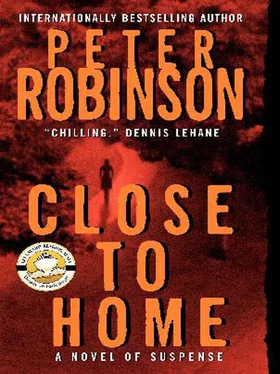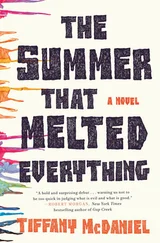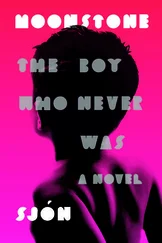Though she believed Liz’s story, Annie found it hard to dredge up any sympathy. Legally, however, any charges that could be brought against them were minor. If reckless negligence could be proved, then they could, at a stretch, be convicted of manslaughter, but even though they had given Luke drugs, Annie reminded herself, she still didn’t know how he had died, or why.
“Do you know where he went after he left your flat?” Annie asked.
“No,” said Liz between sobs. “We never saw him again. I’m sorry. I’m so sorry.”
“Did you or Ryan give Luke any Valium, to calm him down, perhaps?”
Liz frowned and looked at Annie through her tears. “No. We didn’t do stuff like that.”
“So you never had any Valium in the house?”
“No.”
“And there’s nothing more you can tell me?”
“I’ve told you everything.” She looked up at Annie with red eyes. “Can I go home now? I’m tired.”
Annie stood up and called for a uniformed officer. “Yes,” she said. “But don’t wander too far. We’ll be wanting to talk to you again.”
When Liz had been escorted away, Annie closed the interview room door behind her and sat down again and held her throbbing head in her hands.
“Another drink, Alan?”
Banks’s beer glass was half-full, and he had just arranged to go out drinking that evening with Dave Grenfell and Paul Major, so he declined Mrs. Marshall’s offer and ate another potted-meat sandwich instead. Besides, the beer was a neighbor’s home brew, and it tasted like it.
“You know, I’m glad we did this,” Mrs. Marshall went on. “The service. I know it probably seems silly to some people, after all this time, but it means a lot to me.”
“It doesn’t seem silly,” said Banks, looking around the room. Most of the guests were family and neighbors, some of whom Banks recognized. Dave’s and Paul’s parents were there, along with Banks’s own. Pachelbel’s “Canon” played in the background. Graham would have hated it, Banks thought. Or probably not. If he’d lived, his tastes would no doubt have changed, as Banks’s had. Even so, what he really wanted to listen to was “Ticket to Ride” or “Summer Nights” or “Mr. Tambourine Man.”
“I think it meant a lot to all of us,” he said.
“Thank you,” Mrs. Marshall said tearfully. “Are you sure you won’t have some more?”
“No, thank you.”
Mrs. Marshall wandered off. Banks noticed Bill Marshall in his armchair by the fireplace, a blanket over his knees despite the muggy day. The windows were all open, but it was still too stuffy in the house. Banks saw Paul talking to a couple he didn’t recognize, probably old neighbors, and Dave was chatting with Graham’s sister Joan. His own parents were talking to Mrs. and Mrs. Grenfell. Feeling the call of nature, Banks set his glass down on the sideboard and went upstairs.
When he had finished in the toilet, he noticed that the door to Graham’s old room was open, and he was surprised to see that the space-rocket wallpaper he remembered from years back was still on the walls. Drawn by the odd sight, he wandered into the small bedroom. Of course, everything else had changed. The bed was gone, along with the small glass-fronted bookcase Banks remembered, mostly full of science fiction. The only familiar object stood in a case leaning against the wall. Graham’s guitar. So they had kept it all these years.
Certain that no one would mind, Banks sat down on a hard-backed chair and took the guitar out of its case. Graham had been so proud of it, he remembered. Of course, he had wanted an electric one, a Rickenbacker like the one John Lennon played, but he had been chuffed to death with the secondhand acoustic his parents had bought him for Christmas 1964.
Banks remembered the fingering, even after so long, and strummed a C chord. Way out of tune. He grimaced. Tuning it would be too much of a job for the moment. He wondered if Mrs. Marshall wanted to keep it as a memento, or if she would consider selling it. If she would, he’d be glad to buy it from her. He strummed an out-of-tune G seventh, then moved to put the guitar back in its case. As he did so, he thought he heard something slip around inside it. Gently, he shook the guitar, and there it was again: something scraping inside.
Curious, Banks loosened the strings so that he could slip his hand inside. With a bit of juggling and shaking he managed to grab hold of what felt like a piece of stiff, rolled-up paper. Carefully he pulled it out, noticing the dried Sellotape Graham had used to stick it to the inside of the guitar. That made it something he had tried to hide.
And when Banks unrolled it, he saw why.
It was a photograph: Graham sprawled on a sheepskin rug in front of a large, ornate fireplace, arms behind him, hands propping him up, legs stretched out in front. He was smiling at the camera in a flirtatious and knowing manner.
And he was absolutely stark naked.
Michelle was lucky to find a parking spot about a hundred yards from the former Mrs. Harris’s pretentious pile of mock Tudor on Long Road, Cambridge, opposite the grounds of Long Road Sixth Form College. It was still drizzling outside, so she took the umbrella from the back of her car.
It hadn’t been too hard to track down Jet Harris’s ex-wife. The biographical pamphlet told Michelle that her maiden name was Edith Dalton and that she had been married to Harris for twenty-three years, from 1950 to 1973, and that she was ten years his junior. A few discreet inquiries around the office yielded the information that a retired civilian employee, Margery Jenkins, visited her occasionally, and she was happy to give Michelle the address. She also told her that the former Mrs. Harris had remarried and was now called Mrs. Gifford. Michelle hoped that the nature of her inquiries didn’t get back to Shaw before she got the information she needed, whatever that was. She wasn’t even sure what Mrs. Gifford could, or would, tell her.
A slim, elegantly dressed gray-haired woman answered the door, and Michelle introduced herself. With a puzzled but interested expression Mrs. Gifford led Michelle to her large living room. There was no clutter, just a white three-piece suite, various antique cabinets stuffed with crystal, and a large sideboard against the wall. Mrs. Gifford offered nothing in the way of refreshments but sat, legs crossed, and lit a cigarette from a gold lighter. She had a calculating look about her, Michelle noticed – around the eyes, in the eyes themselves, in the strict set of her jaw and sharp angles of her cheeks. She was also very well-preserved for her seventy-plus years and had a deep tan, the sort she couldn’t have got in England so far this summer.
“The Algarve,” she said, as if she had noticed Michelle looking. “Got back last week. My husband and I have a nice little villa there. He was a doctor, a plastic surgeon, but he’s retired now, of course. Anyway, what can I do for you? It’s been a long time since the coppers came to call.”
So Edith Dalton had landed on her feet after twenty-three years of marriage to Jet Harris. “Just information,” said Michelle. You’ve heard about the Graham Marshall case?”
“Yes. Poor lad.” Mrs. Gifford tapped her cigarette against the side of a glass ashtray. “What about him?”
“Your husband was in charge of that investigation.”
“I remember.”
“Did he ever talk about it, tell you any of his theories?”
“John never talked about his work to me.”
“But something like that? A local boy. Surely you must have been curious?”
“Naturally. But he made a point of not discussing his cases at home.”
“So he didn’t have any theories?”
“Not that he shared with me.”
“Do you remember Ben Shaw?”
Читать дальше












